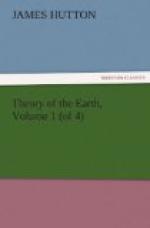Let us now proceed in endeavouring to decide this important question, viz. By what active principle is it, that the present state of things, which we observe in the strata of the earth, a state so very different from that in which those bodies had been formed originally, has been brought about?
Two causes have been now proposed for the consolidating of loose materials which had been in an incoherent state; these are, on the one hand, fire; or, on the other, water, as the means of bringing about that event. We are, therefore, to consider well, what may be the consequences of consolidation by the one or other of those agents; and what may be the respective powers of those agents with respect to this operation.
If we are not informed in this branch of science, we may gaze without instruction upon the most convincing proofs of what we want to attain. If our knowledge is imperfect, we may form erroneous principles, and deceive ourselves in reasoning with regard to those works of nature, which are wisely calculated for our instruction.
The strata, formed at the bottom of the sea, are to be considered as having been consolidated, either by aqueous solution and crystallization, or by the effect of heat and fusion. If it is in the first of these two ways that the solid strata of the globe have attained to their present state, there will be a certain uniformity observable in the effects; and there will be general laws, by which this operation must have been conducted. Therefore, knowing those general laws, and making just observations with regard to the natural appearances of those consolidated masses, a philosopher, in his closet, should be able to determine, what may, and what may not have been transacted in the bowels of the earth, or below the bottom of the ocean.
Let us now endeavour to ascertain what may have been the power of water, acting under fixed circumstances, operating upon known substances, and conducting to a certain end.
The action of water upon all different substances is an operation with which we are familiar. We have it in our power to apply water in different degrees of heat for the solution of bodies, and under various degrees of compression; consequently, there is no reason to conclude any thing mysterious in the operations of the globe, which are to be performed by means of water, unless an immense compressing power should alter the nature of those operations. But compression alters the relation of evaporation only with regard to heat, or it changes the degree of heat which water may be made to sustain; consequently, we are to look for no occult quality in water acting upon bodies at the bottom of the deepest ocean, more than what can be observed in experiments which we have it in our power to try.
With regard again to the effect of time: Though the continuance of time may do much in those operations which are extremely slow, where no change, to our observation, had appeared to take place, yet, where it is not in the nature of things to produce the change in question, the unlimited course of time would be no more effectual, than the moment by which we measure events in our observations.




